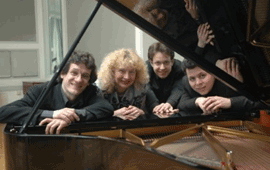> [Archived] Interviews

An Interview with the Cellist Bogdan Jianu
Why Jacques Thibaud and who are your partners?
Jacques Thibaud, indeed. Why? Because this great violinist had a major contribution when it comes to chamber music. Together with his partners - Pablo Casals and Alfred Cortot - he offered the world great recordings, memorable concerts. My colleagues in the string trio chose this name to represent our ensemble. The ensemble started as a string trio. The founding members were: Burkhard Maiss - violinist, Philippe Duvier - violist, and the first cellist of the ensemble was Uwe Hirth-Schmidt, from Berlin. They started their activity in 1994. And in 1996 I got to Berlin, where I started to study in Professor Ilea's class, then I transferred to Professor Nikosh's class, and in 2004 they changed their cellist.
Who are the current members of the ensemble?
Burkhard Maiss is still the violinist of the group, I am the cellist, we have a new violist - Hannah Strijbos, a fantastic violist from the Netherlands, very young - not 25 yet - but her music is very mature, then Andrei Banciu - the Romanian pianist, from Timisoara and the Dutch flutist Eleonore Pameijer.
What programme will you present?
It is a beautiful programme, starting with a sonata by Donizetti. Few people know that Gaetano Donizetti also composed chamber music before creating his great operas - there are a trio with a piano and a quartet, there are also several wonderful, but rather little known works. Tomorrow we'll interpret his Sonata for Flute and Piano in C Major, then Piano Trio in C Minor, op. 1, no. 3 by Beethoven - also a very special work, and, in the end, Mozart with the Jupiter Symphony (No. 41), without an orchestra, of course, but with flute, violin, cello and piano - it's an arrangement made by Hummel. Hummel was one of Mozart's students and, as it happens, there is also a direct connection to Beethoven: he refused to take Beethoven as student, and then we have this combination Mozart-Hummel-Beethoven in the same programme. Hummel signed several arrangements of works by Mozart for his personal concerts, and tomorrow we'll be playing his arrangement for the Jupiter Symphony.
After this concert, which are a few of the 2014 projects?
Our most important project is, definitely, the new album that we'll be recording in February, an album with a programme for a string trio, consisting of both famous and less-known composers. Among the well-known - Max Reger, Dohnanyi, and the unknown, at least for us in the beginning, is Jean Cras, a fantastic composer, born in 1879, dead in 1932; actually, he was a universal genius, not only a composer, but also a mathematician, architect, admiral of the French war fleet. For example, he invented the gyrocompass, mathematical theorems etc. As a composer, Jean Cras left a lot of works: not very well-known, unfortunately, but absolutely brilliant. I'm really glad that we'll make this album, including his trio. Furthermore, with Eleonore Pameijer we'll have a rather special programme, containing works of Szekely - a great violinist, Paul Zenman, Geza Frid, Kodaly, Bartok. The concert will take place in Amsterdam and, again, we'll have our violist next to us.
Translated by Mihaela Olinescu and Elena Daniela Radu
MTTLC, The University of Bucharest














